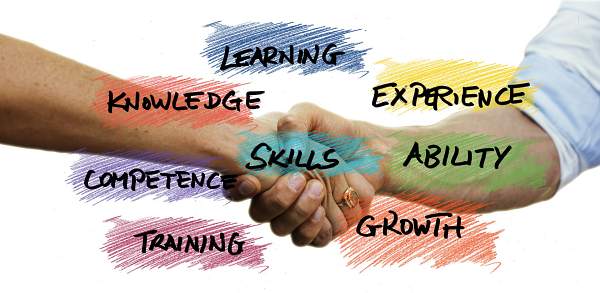Intrapersonal Skills vs. Interpersonal Skills
We live in an era where having strong hard skills is commonly seen as key to getting a great job, but when it comes to specific roles and levels (where emotional intelligence, empathy for example are key skills), you need more intrapersonal and interpersonal skills to succeed. Sometimes they even decide if you get the job or not.
Without good personal (or intra-personal) skills, you are less likely to develop good interpersonal, presentation, or leadership skills.
Interpersonal skills are the skills or abilities that we use to communicate with others. In contrast, intrapersonal skills are the skills or abilities that every single one of us has, not entirely related to communication with others.
The interpersonal skill is responsible for a person’s communicative aspect, how they interact or relate to others. Interpersonal skills can be acquired but cannot be specifically taught or measured.
Below, you’ll find in detail the difference between personal and interpersonal skills, the difference between intrapersonal and interpersonal skills, some examples of each, and many more.
Related Topics:
Top 15 Interpersonal Skills at Work
What is the definition of a Skill?
A skill is a characteristic or particularity of an individual who has the ability and skill. We can say that a person with skill has talent, intelligence. These terms become synonymous with skill and expertise, mastery, practice, competence, wit, insight, cunning, and suitability.
Types of Personal skills
There are two kinds of personal skills: Interpersonal skills, while the other is called hard skills or professional skills.
Interpersonal skills are the ones that are related to our emotions, attitudes, habits, social manners, communication style, and also personality. This kind of personal skill is responsible for all types of relationships in our lives.
On the other hand, hard or professional skills are related to a specific type of task performance. Hard skills are used mostly at work. These skills are usually abilities and knowledge related to certain areas. The individual often gains hard skills via education and experience.
Interpersonal and hard skills are a necessity. They work Side by Side and can complement each other, which creates a unique personality for an individual and a powerful candidate for a job interview.
Interpersonal skills vs. Intrapersonal skills
Interpersonal skills are different from intrapersonal skills, and while both are communication-oriented, they operate in different ways.
Intrapersonal skills deal with self-communicating. It consists of self-talk, personal reflection, introspection, and so on. It can happen in many ways. Working through a problem in your mind is a form of intrapersonal skill.
Talking to yourself out loud doesn’t mean that you’re getting crazy. It’s just a form of intrapersonal skill. Journaling or blogging is also a form of intrapersonal skill.
Engaging in intrapersonal skills is good. It helps you to understand better your feelings, desires, problems, and emotions as well.
A person with strong intrapersonal intelligence focuses more than others on reflection, introspection, and self-analysis. They pay attention to their thoughts, feelings, and emotions to better understand their motivations and goals.
What are Interpersonal Skills? 8 Examples
As you know, interpersonal skill is a part of the personal skill of an individual. Interpersonal skills are those essential skills involved in dealing with and relating to other peoples.
These skills involve the ability to build relationships with others. Sometimes called people skills, they tend to incorporate your personality traits and how you’ve learned to handle certain social situations. Practical interpersonal skills can help you during the job interview process and can have a positive impact on your career advancement as well.

Some examples of interpersonal skills include:
- Teamwork
Working well and in harmony with others while pursuing a common goal is also crucial in the working environment. But also is the ability to work with little supervision.
- Responsibility
A person who has a sense of responsibility in his work recognizes the importance of his knowledge and skills, and abilities for the organization and is involved in the work processes, dedicating himself to making them better and more effective.
- Leadership
Leadership consists of a strong sense of self-confidence and comprehensive knowledge of company goals. These are the qualities that motivate and inspire, providing a solid foundation for teamwork.
- Flexibility
One of the essential skills in the job market is flexibility. A professional who adapts quickly to new challenges and changes has excellent chances of having a very successful and stable career.
- Patience
The skill to have self-control when you can’t control people’s behavior or when things don’t go as you want. To be patient is to be serene and tolerant in the face of difficulties.
- Empathy
The skill that someone has to feel what someone else is feeling, physically and emotionally, puts yourself in someone else’s shoes. Strong interpersonal skills are an asset in the working environment that can help you navigate complex change and day-to-day tasks.
- Listening
Having excellent interpersonal skills doesn’t always come to communication. Listening is also essential. Taking an active listening role as someone is speaking is a great way to level up your interpersonal skill.
- Negotiation
Being a great negotiator comes in handy because negotiating requires listening skills, planning and visualization, and problem-solving abilities, all essential parts of interpersonal skills.
We all use interpersonal skills every day. Strongly associated with emotional intelligence, interpersonal skills refer to how we interact with others. As you make the transition into the world of work, interpersonal skills become increasingly important.
Why Are Interpersonal Skills Important?
Most of the time, it won’t matter where you work or what your job is. Your interpersonal skills will strongly impact the way your career progresses. And If you have strong interpersonal skills, your team will function better together, and you will all accomplish more. If you don’t, the opposite will happen as well.
A person with strong interpersonal skills will likely stand out from the crowd, whether in a school group activity or a job interview. They complement your technical abilities, enhance performance, boost social interactions, and give you an edge over your competition.
When applying for a job interview, you must consider the types of interpersonal skills you need or already have. Next, match the required skills with examples from previous work and life experience.
Conclusion
It doesn’t matter what you do for a living, interacting with others is essential, and interpersonal skills are crucial to your success. Whether you realized it or not, employers are looking for candidates with good interpersonal skills, which means that you have to take them just as seriously as you do your technical skills.
In such a competitive job market, it’s crucial to pay attention to what interpersonal skills you convey to potential employers and how those skills measure up to the position’s requirements.
Although personal skills are essential for growth and survival, they alone do not make a human complete. Either in the corporate world or in your personal life, other skills are necessary for the full development of human beings, such as interpersonal skills.
References and Further Reading
AceThePresentaion.The 4 Methods or Types of Speech Delivery
AceThePresentation.How to Improve your Communication Skills – 7 Essential Communication skills








